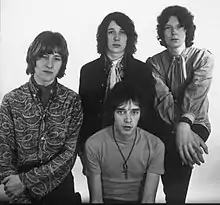Mabel Greer's Toyshop
Mabel Greer's Toyshop are an English progressive rock (initially as psychedelic rock) band formed in London and initially active from 1966 to 1968. The band was the precursor to the rock band Yes. Their music was marked by a combination of psychedelic, American blues and classically influenced arrangements with poetic lyrics. Members included Chris Squire, Peter Banks, Clive Bayley, Robert Hagger and later Jon Anderson. The band reformed in 2014 with original members, singer and guitarist Clive Bayley and drummer Robert Hagger, along with Hugo Barré, Tony Kaye, and Billy Sherwood.
Mabel Greer's Toyshop | |
|---|---|
 The early 1968 line-up | |
| Background information | |
| Origin | London, England |
| Genres | |
| Years active |
|
| Labels |
|
| Spinoffs | Yes |
| Members |
|
| Past members | |
| Website | mabelgreerstoyshop |
History
Mabel Greer's Toyshop was formed in 1966 by composer-guitarist and vocalist Clive Bayley, drummer Robert Hagger and bassist Paul Rutledge. Other sources state that Chris Squire formed the band in January 1968.[1] Hagger had previously met Squire, bassist of the Syn, after having auditioned for them earlier. The Syn broke up in 1967 and Squire was asked to join Mabel Greer. Peter Banks also from the Syn joined soon afterwards. Early in 1968 Jon Anderson joined the band after meeting Squire in a Soho nightclub.[2]
Mabel Greer worked in the London clubs and Universities around London, including The Marquee, Electric Garden, UFO and Happening 44.[3] During this time the band met influential BBC radio DJ John Peel at the Middle Earth club in London, and they recorded some tracks for Peel's radio shows, Top Gear and Night Ride.[4] Some of the tracks were included on The Roots of Yes a compilation album released by Banks, such as "Beyond and Before", a later version of which appeared on the first Yes album, Yes (1969). Mabel Greer also did some demo recording session with the producer Mike Leander for MCA Records.
One of the last gigs for Mabel Greer's Toyshop before they changed their name to Yes was in May 1968 in Highgate, London. Described on the cover of the Yes box set The Word Is Live in 2005, the line-up was Squire, Jon Anderson, Banks, Bayley and Hagger.[5] Bill Bruford replaced Hagger in June 1968, followed by Tony Kaye, who joined the band on keyboards, and Banks, who had left the group for a month, came back as the guitarist replacing Bailey in July. After their last gig on 27 July 1968, Mabel Greer's Toyshop renamed themselves Yes, as per Banks's suggestion.[6]
The band reformed in 2014 with Bayley, Hagger, Barré, Kaye, and Yes producer and bass guitarist Billy Sherwood.[7] The album New Way of Life was released in 2015 and includes new music as well some songs written back in 1967 and 1968 by Bayley and Squire.
The album The Secret was released on 8 December 2017. It featured a track called "The Secret" recorded in honour of Peter Banks, whose guitar work is featured.[8]
Discography
Studio albums
- New Way of Life (2015)
- Images (2016) (re-master of recordings from 1967–1968)
- The Secret (2017)
Personnel
Past and current members: Clive Bayley, Robert Hagger, Chris Squire, Peter Banks, Jon Anderson, Bill Bruford, Tony Kaye, Hugo Barré, Billy Sherwood and Max Hunt.
References
- Welch, Chris (11 November 2009). Close to the Edge - The Story of Yes. Omnibus. pp. 33–34. ISBN 978-0-85712-042-7.
In January 1968 Chris Squire put together a new band called Mabel Greer's Toyshop.
- "Jon Anderson biography". billboard.com.
- David Watkinson (2001). Yes, Perpetual Change. Plexus.
- Will Romano. Close To The Edge How Yes's Masterpiece Defined Prog Rock.
- Bob Hagger (2008), The Word is Live
- "07/27/1968 Newmarket, United Kingdom". Retrieved 24 September 2023.
- Scott Munro (13 November 2014). "Mabel Greer's Toyshop Reunite". teamrock.com.
- "Mabel Greer's Toyshop ready new album The Secret | Louder". Loudersound.com. 29 November 2017. Retrieved 27 May 2020.
Further reading
- Chris Welch, Close To The Edge, The Story of Yes, Omnibus Press, 2000
- David Watkinson, "Yes: Perpetual Change", Plexus Publishing Limited, 2001
- Peter Banks, "Beyond And Before" Golden Treasures Publishing Arkansas, 2001
- Will Romano, "Close To The Edge: How Yes's Masterpiece Defined Prog Rock" Backbeat Books, 2017